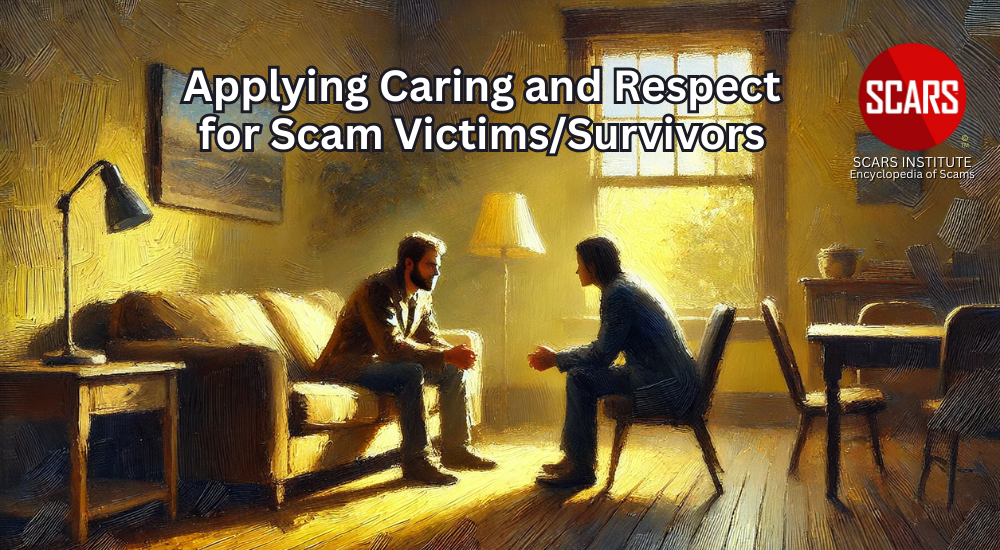
SCARS Institute’s Encyclopedia of Scams™ Published Continuously for 25 Years

RSN™ Editorial: Civil Rights – Term Abuse
Many Victims And Their Friends Or Family Tell Us That Scammers Violated Their Civil Rights – Did They?
They Also Tell Us They Hate The Current American Administration, And Specifically U.S. President Donald Trump Because Of “Civil Rights!”
What Does That Even Mean?
As a political activist and nongovernmental advocacy organization we deal with the United States government frequently, we were in a two-hour call with the Department of Homeland Security just yesterday. Constantly we see people who’s political leaning is to the left throw out “Civil Rights” as an excuse not to work together to accomplish real goals.
If you are “one of those people” who truly believes that, then you have no chance of changing things. Please step aside and let the rest of us get the real work done.
Scams are a crime, no doubt about that. But people say that scams are a “civil right.” We had two people tell us that in their rants about the current U.S. President, like that somehow explained something. That is just a label people apply to anything that they won’t or can’t actually talk about.
Scammers abuse people to be sure, they are thugs and criminals. They cause great harm, but probably no scam victim had their “civil rights” denied. (We would welcome a formal legal oppinion on this if anyone would care to provide one.)
Civil rights are the rights of citizens to political and social freedom and equality. Note the word citizens – meaning the definition of civil rights are LOCAL to each country and in some cases a state or province in that country. They are NOT HUMAN RIGHTS!
Civil rights are an expansive and significant set of rights granted by a specific country, such as the United States that are designed to protect individuals from unfair treatment by their government and fellow citizens; they are the rights of individuals to receive equal treatment (and to be free from unfair treatment or discrimination) in a number of settings — including education, employment, housing, public accommodations, and more — and based on certain legally-protected characteristics. Notice that doesn’t say anything about international criminal cartels?
Ignorance of what civil rights actually are is one of the major barriers to political discussion and being able to find and enact real solutions in the U.S. and other countries, especially by the Socialist side of the political spectrum. It has been so indoctrinated into people that they throw out the “Civil Rights” hand grenade when anyone talks about actual political solutions as though it makes them sound higher and more intelligent than the person they are putting down. The abuse of that term is not only an insult to the real abuses of civil rights that have occurred and that still occur around the world. But remember the key fact, civil rights are not human rights, and they are “granted” by a government. For example, civil rights are different in the United States vs. Canada vs Germany vs. China. Mistakenly believing otherwise is not only foolish but dangerous.
However, scamming organizations are involved in abuses of “Human Rights” such as slavery, human trafficking, and other real abuses of human rights. Make no mistake that those are real, deadly, and a cause of massive suffering – but we don’t mean Hillary not winning kind of suffering. We mean the kind where children die everyday kind of suffering.
When people spout “civil rights” like it is some magic bullet it does every real victim of a scam a great disservice by distracting from the real issues and the real solutions.
If you disagree, then (at least in many countries) you have the civil right to your opinion, and you can leave our website for more liberal mindsets. We, on the other hand, are working to solve these problems – real problems – without the foolishness of political double-speak.
If you want to be part of the solution then use your terms properly and understand what they really mean. Words only have power when they are used properly with the right meaning, when used inappropriately they are a weapon used to deny civil rights – think about that for a moment!
PLEASE NOTE: THIS ARTICLE IS NOT SPEAKING ABOUT VICTIM’S RIGHTS WHICH WE HOLD IN VERY HIGH REGARD. WE ARE DEFENDERS OF VICTIMS RIGHTS, BUT THAT IS A DIFFERENT TOPIC.
What Are Some Of The Civil Rights That Are Violated By Scammers?
Certainly, It Seems Logical That Scammers Violate Civil Rights, But Do They Really?
Civil rights include the ensuring of peoples’ physical and mental integrity, life, and safety; protection from discrimination on grounds such as race, gender, sexual orientation, gender identity, national origin, color, age, political affiliation, ethnicity, religion, and disability; and individual rights such as privacy and the freedoms of thought, speech, religion, press, assembly, and movement.
Clearly, There Are Civil Rights Violations In These:
- Gender-based discrimination – scammers target specific sexes to commit their crimes.
- Religious-based discrimination – most scammers are Muslim and they more frequently target Christian victims.
There is one major flaw in all of this. Civil rights are country-specific and when you cross international boundaries your civil rights change. As we have said before, civil rights are not human rights. The result is that unless the scammer is in your country civil rights do not really apply unless of course in their country they have the same civil rights and those rights extend outside of their borders.
Of course, remember that scammers claim they are part of their Yahoo or Sakawa religious rituals. Therefore police enforcement could also be viewed (in their eyes) as religious discrimination! Plus targeting Nigerian or Ghanaian scammers could be viewed as discrimination based upon national origin. Eventually throwing out the words “civil rights” breaks down into these issues and we are better to focus on simple crime, punishment, and the treaties needed to accomplish them.
So Let’s Talk About Human Rights And Scamming!
Please note that this is the Official Position of the United Nations High Commission on Human Rights.
What Are Human Rights?
Human rights are rights inherent to all human beings, whatever their nationality, place of residence, sex, national or ethnic origin, color, religion, language, or any other status. We are all equally entitled to our human rights without discrimination. These rights are all interrelated, interdependent and indivisible.
Universal human rights are often expressed and guaranteed by law, in the forms of treaties, customary international law, general principles and other sources of international law. International human rights law lays down obligations of Governments to act in certain ways or to refrain from certain acts, in order to promote and protect human rights and fundamental freedoms of individuals or groups. When those human rights are embodied in law they can become Civil Rights in that country too.
Universal And Inalienable Human Rights
[NOTE: The term State means Country]The principle of universality of human rights is the cornerstone of international human rights law. This principle, as first emphasized in the Universal Declaration on Human Rights in 1948, has been reiterated in numerous international human rights conventions, declarations, and resolutions. The 1993 Vienna World Conference on Human Rights, for example, noted that it is the duty of Countries to promote and protect all human rights and fundamental freedoms, regardless of their political, economic and cultural systems.
All Countries have ratified at least one, and 80% of States have ratified four or more, of the core human rights treaties, reflecting the consent of States which creates legal obligations for them and giving concrete expression to universality. Some fundamental human rights norms enjoy universal protection by customary international law across all boundaries and civilizations.
Human rights are inalienable. They should not be taken away, except in specific situations and according to due process. For example, the right to liberty may be restricted if a person is found guilty of a crime by a court of law.
Interdependent And Indivisible
All human rights are indivisible, whether they are civil and political rights, such as the right to life, equality before the law and freedom of expression; economic, social and cultural rights, such as the rights to work, social security and education , or collective rights, such as the rights to development and self-determination, are indivisible, interrelated and interdependent. The improvement of one right facilitates advancement of the others. Likewise, the deprivation of one right adversely affects the others.
Equal And Non-Discriminatory
Non-discrimination is a cross-cutting principle in international human rights law. The principle is present in all the major human rights treaties and provides the central theme of some of international human rights conventions such as the International Convention on the Elimination of All Forms of Racial Discrimination and the Convention on the Elimination of All Forms of Discrimination against Women.
The principle applies to everyone in relation to all human rights and freedoms and it prohibits discrimination on the basis of a list of non-exhaustive categories such as sex, race, colour and so on. The principle of non-discrimination is complemented by the principle of equality, as stated in Article 1 of the Universal Declaration of Human Rights: “All human beings are born free and equal in dignity and rights.”
Both Rights and Obligations
Human rights entail both rights and obligations. States assume obligations and duties under international law to respect, to protect and to fulfill human rights. The obligation to respect means that States must refrain from interfering with or curtailing the enjoyment of human rights. The obligation to protect requires States to protect individuals and groups against human rights abuses. The obligation to fulfill means that States must take positive action to facilitate the enjoyment of basic human rights. At the individual level, while we are entitled to our human rights, we should also respect the human rights of others.
Human Rights Violations
Human rights violations occur when actions by Countries (or non-country) actors abuse, ignore or deny basic human rights. Furthermore, violations of human rights can occur when any country or non-country actor breaches any part of the UDHR treaty or other international human rights or humanitarian law. In regard to human rights violations of United Nations laws, Article 39 of the United Nations Charter designates the UN Security Council (or an appointed authority) as the only tribunal that may determine UN human rights violations – however. the U.N. has proven itself non-functional in the real world of protecting human rights. Human rights are ONLY maintained and enforced by the major countries such as the United States and others. For that reason, all guarantees and progress against violations must be accomplished at the national governmental level since only countries have the power to punish other countries for their behavior.
Basic Human Rights
- Right to life
- Freedom from torture
- Freedom from slavery
- Right to a fair trial
- Freedom of speech
- Freedom of thought, conscience, and religion
- Freedom of movement (within a Country)
How Are Scams An Infringement Of Human Rights?
This Is A Complex Legal Question And One That Is Not Always Easy To Define.
However, Generally Speaking, Scams (In Certain Contexts) Appear To Infringe On Some Human Rights.
For example – freedom of thought. Certainly, scammers attempt to use manipulative techniques to control their victim’s thoughts and thus their actions. While we recognize the denial of a victim’s human right in this, it is not often recognized as a violation of their civil rights since they retained the power to say no at any time.
Same for freedom of speech – we know of no victims that have this human right denied. Of course, this is not the right to speech in any forum, people can say what they want in public but not on Facebook for example. Is that a denial of a human right? That is more likely a denial of a civil right, but laws currently side with Facebook on this.
However, scammers independently of their scamming do infringe on the human rights of others. Their organizations are frequent funders of slavery and human trafficking either directly or indirectly, and also (in some cases) fund terrorism.
Summary
As you can see in very few cases are scamming a violation of either civil rights or human rights. It doesn’t make them less of a devastating crime, but putting it in the proper context is not only the way to communicate its impact, victims, and solutions but also the way to seek new approaches to solving them. Let us be clear in what we mean when we use terms like “civil rights” and that we actually know what they mean, not what wishful thinking or political indoctrination has told us what they mean.
At SCARS we work towards real-world solutions on many fronts. We are also a “Human Rights” watchdog organization to the extent that governments fail to act to protect their citizens from these crimes. We see far more value in working with the government to solve these issues than to wave signs that just say the government is bad and “civil rights”.
Please Feel Free To Share Your Thoughts – Just Remember, Your Freedom Of Opinion Is Not Guaranteed On Our Pages So Be Civil!
RSN Team
a division of the Society of Citizens Against Romance Scams [SCARS]
Miami Florida U.S.A.
– – –
WESTERN UNION REPAYMENT PROGRAM NEWS
FOR THE LATEST INFORMATION ABOUT THE WESTERN UNION REPAYMENT / REMISSION PROGRAM CLICK HERE – IT IS STILL OPEN FOR A PETITIONS FOR REPAYMENT
– – –
Tell us about your experiences with Romance Scammers in our Scams Discussion Forum on Facebook »
FAQ: How Do You Properly Report Scammers?
It is essential that law enforcement knows about scams & scammers, even though there is nothing (in most cases) that they can do.
Always report scams involving money lost or where you received money to:
- Local Police – ask them to take an “informational” police report – say you need it for your insurance
- Your National Police or FBI (www.IC3.gov)
- The Scars Worldwide Reporting Network HERE or on www.Anyscam.com
This helps your government understand the problem, and allows law enforcement to add scammers on watch lists worldwide.
Visit our NEW Main SCARS™ News & Information Facebook page for much more information about scams and online crime: www.facebook.com/SCARS.News.And.Information
To learn more about SCARS visit www.AgainstScams.org
Please be sure to report all scammers HERE or on www.Anyscam.com
All original content is Copyright © 1991 – 2018 SCARS All Rights Reserved Worldwide & Webwide – RSN/Romance Scams Now & SCARS/Society of Citizens Against Romance Scams are all trademarks of Society of Citizens Against Romance Scams Inc.
#ReportingScammers #WhereToReportScams #Anyscam #SCARS #RSN #CatchScammers #ScammerWatchLists #ArrestScammers #REPORTSCAMMERS #ANYSCAM #AVOIDSCAMS #ROMANCESCAMS #ACTAGAINSTSCAMS #NIGERIANSCAMMERS #ROMANCESCAMSNOW #SCARS #GHANASCAMMERS #FAKEPROFILES #FACEBOOKSCAMMERS #BOYCOTTAFRICANCOFFEE
-/ 30 /-
What do you think about this?
Please share your thoughts in a comment below!
Table of Contents
LEAVE A COMMENT?
Thank you for your comment. You may receive an email to follow up. We never share your data with marketers.
Recent Comments
On Other Articles
- on Finally Tax Relief for American Scam Victims is on the Horizon – 2026: “I just did my taxes for 2025 my tax account said so far for romances scam we cd not take…” Feb 25, 19:50
- on Reporting Scams & Interacting With The Police – A Scam Victim’s Checklist [VIDEO]: “Yes, this is a scam. For your own sanity, just block them completely.” Feb 25, 15:37
- on Danielle Delaunay/Danielle Genevieve – Stolen Identity/Stolen Photos – Impersonation Victim UPDATED 2024: “She goes by the name of Sanrda John now” Feb 25, 10:26
- on Reporting Scams & Interacting With The Police – A Scam Victim’s Checklist [VIDEO]: “So far I have not been scam out of any money because I was aware not to give the money…” Feb 25, 07:46
- on Love Bombing And How Romance Scam Victims Are Forced To Feel: “I was love bombed to the point that I would do just about anything for the scammer(s). I was told…” Feb 11, 14:24
- on Dani Daniels (Kira Lee Orsag): Another Scammer’s Favorite: “You provide a valuable service! I wish more people knew about it!” Feb 10, 15:05
- on Danielle Delaunay/Danielle Genevieve – Stolen Identity/Stolen Photos – Impersonation Victim UPDATED 2024: “We highly recommend that you simply turn away form the scam and scammers, and focus on the development of a…” Feb 4, 19:47
- on The Art Of Deception: The Fundamental Principals Of Successful Deceptions – 2024: “I experienced many of the deceptive tactics that romance scammers use. I was told various stories of hardship and why…” Feb 4, 15:27
- on Danielle Delaunay/Danielle Genevieve – Stolen Identity/Stolen Photos – Impersonation Victim UPDATED 2024: “Yes, I’m in that exact situation also. “Danielle” has seriously scammed me for 3 years now. “She” (he) doesn’t know…” Feb 4, 14:58
- on An Essay on Justice and Money Recovery – 2026: “you are so right I accidentally clicked on online justice I signed an agreement for 12k upfront but cd only…” Feb 3, 08:16
ARTICLE META
Important Information for New Scam Victims
- Please visit www.ScamVictimsSupport.org – a SCARS Website for New Scam Victims & Sextortion Victims
- Enroll in FREE SCARS Scam Survivor’s School now at www.SCARSeducation.org
- Please visit www.ScamPsychology.org – to more fully understand the psychological concepts involved in scams and scam victim recovery
If you are looking for local trauma counselors please visit counseling.AgainstScams.org or join SCARS for our counseling/therapy benefit: membership.AgainstScams.org
If you need to speak with someone now, you can dial 988 or find phone numbers for crisis hotlines all around the world here: www.opencounseling.com/suicide-hotlines
A Note About Labeling!
We often use the term ‘scam victim’ in our articles, but this is a convenience to help those searching for information in search engines like Google. It is just a convenience and has no deeper meaning. If you have come through such an experience, YOU are a Survivor! It was not your fault. You are not alone! Axios!
A Question of Trust
At the SCARS Institute, we invite you to do your own research on the topics we speak about and publish, Our team investigates the subject being discussed, especially when it comes to understanding the scam victims-survivors experience. You can do Google searches but in many cases, you will have to wade through scientific papers and studies. However, remember that biases and perspectives matter and influence the outcome. Regardless, we encourage you to explore these topics as thoroughly as you can for your own awareness.
Statement About Victim Blaming
SCARS Institute articles examine different aspects of the scam victim experience, as well as those who may have been secondary victims. This work focuses on understanding victimization through the science of victimology, including common psychological and behavioral responses. The purpose is to help victims and survivors understand why these crimes occurred, reduce shame and self-blame, strengthen recovery programs and victim opportunities, and lower the risk of future victimization.
At times, these discussions may sound uncomfortable, overwhelming, or may be mistaken for blame. They are not. Scam victims are never blamed. Our goal is to explain the mechanisms of deception and the human responses that scammers exploit, and the processes that occur after the scam ends, so victims can better understand what happened to them and why it felt convincing at the time, and what the path looks like going forward.
Articles that address the psychology, neurology, physiology, and other characteristics of scams and the victim experience recognize that all people share cognitive and emotional traits that can be manipulated under the right conditions. These characteristics are not flaws. They are normal human functions that criminals deliberately exploit. Victims typically have little awareness of these mechanisms while a scam is unfolding and a very limited ability to control them. Awareness often comes only after the harm has occurred.
By explaining these processes, these articles help victims make sense of their experiences, understand common post-scam reactions, and identify ways to protect themselves moving forward. This knowledge supports recovery by replacing confusion and self-blame with clarity, context, and self-compassion.
Additional educational material on these topics is available at ScamPsychology.org – ScamsNOW.com and other SCARS Institute websites.
Psychology Disclaimer:
All articles about psychology and the human brain on this website are for information & education only
The information provided in this article is intended for educational and self-help purposes only and should not be construed as a substitute for professional therapy or counseling.
While any self-help techniques outlined herein may be beneficial for scam victims seeking to recover from their experience and move towards recovery, it is important to consult with a qualified mental health professional before initiating any course of action. Each individual’s experience and needs are unique, and what works for one person may not be suitable for another.
Additionally, any approach may not be appropriate for individuals with certain pre-existing mental health conditions or trauma histories. It is advisable to seek guidance from a licensed therapist or counselor who can provide personalized support, guidance, and treatment tailored to your specific needs.
If you are experiencing significant distress or emotional difficulties related to a scam or other traumatic event, please consult your doctor or mental health provider for appropriate care and support.
Also read our SCARS Institute Statement about Professional Care for Scam Victims – click here to go to our ScamsNOW.com website.

















It certainly feels like our rights are being violated but i think if we were paying attention we would have heeded that little voice that kept saying; this is not real. Saved me from losing my money.
We agree with how it feels, but feelings are not international law. It is critically important to not let feeling control your perceptions of reality, right?